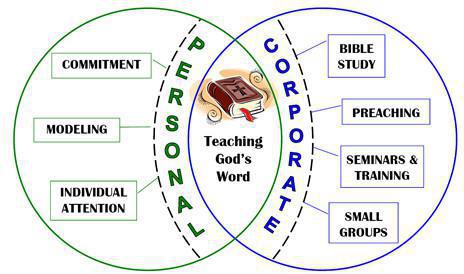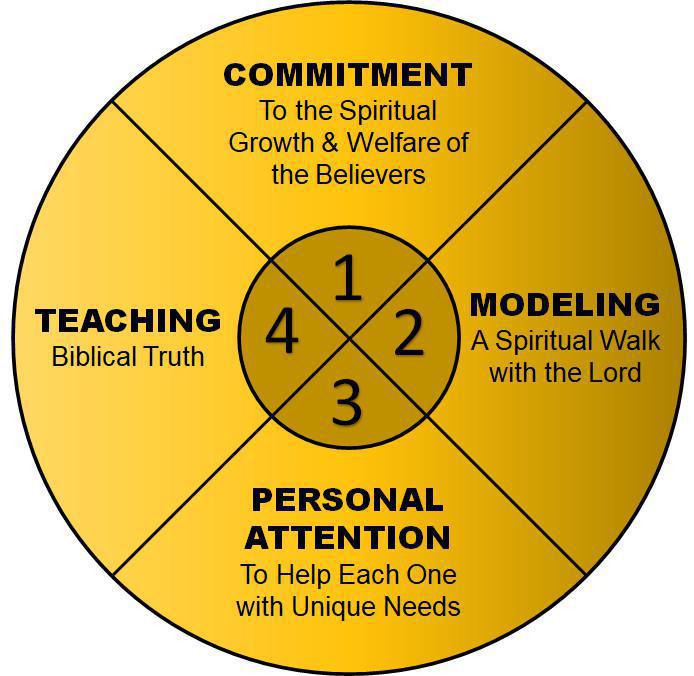II. CONSIDER BALANCED DISCIPLESHIP
To Effectively Grow a Spiritually Healthy Church
Let’s consider what the typical church model for spiritual growth looks like, and how it can be improved for greater effectiveness.
Typical Church Model
The typical church has been successful in providing “Corporate Discipleship”, which is an essential element for healthy individual spiritual growth, as well as for healthy church growth
Corporate Discipleship includes:
- Teaching God’s Word
- Bible Study
- Preaching
- Conducting Seminars and Training
- Small Groups
These forms of discipleship will often be led by a believer who has the gift of teaching. Bible school or seminary training is helpful, but not essential.
Balanced Discipleship
The diagram below depicts what a Balanced Approach might look like, consisting of both “Corporate Discipleship” AND “Personal Discipleship”.
While the two types of discipleship have their unique roles, they complement each other.
Many churches are heavily weighted towards corporate discipleship, which often has the appearance of being more efficient, because one person can teach many.
Personal discipleship is generally more resource intensive (time, energy, finances), but we have found that it is more effective for healthy spiritual growth.
Many church leaders would like to be available to give each believer adequate individual attention, but that is impractical, due to their numerous other responsibilities, and lack of time.
Note that personal discipleship should be done by the “Body” – the equipped / trained believers working in cooperation with the leaders!
We have found that adding “Personal Discipleship,” will exponentially accelerate healthy spiritual growth.
The Four Components of Spiritual Parenting or Spiritual Mentoring
1) God’s Word:
“Teaching God's Word” is an essential component common to both the Corporate and the Personal side of all discipleship. God does not want the Bible to be seen simply as an academic text, but rather as a revelation of His character. The Bible is a means by which humans can “know” Him.
This is eternal life: that they may know You, … (John 17:3). The Holy Spirit’s guidance will always be in accordance with His Word.
Biblical truth is an essential component of Biblical discipleship.
A Christian cannot be spiritually mature without Biblical understanding, but a Christian may have much Biblical knowledge and yet not be spiritually mature.
1 Corinthians 8:1-2 … Knowledge inflates with pride, but love builds up. If anyone thinks he knows anything, he does not yet know it as he ought to know it.
Ephesians 4:11-16 … for the training of the saints in the work of ministry, to build up the body of Christ, until we all reach unity in the faith and in the knowledge of God’s Son, growing into a mature man with a stature measured by Christ’s fullness. Then we will no longer be little children, …
Colossians 1:28-29 We proclaim Him, warning and teaching everyone with all wisdom, so that we may present everyone mature in Christ.
1 Thessalonians 2:13 This is why we constantly thank God, because when you received the message about God that you heard from us, you welcomed it not as a human message, but as it truly is, the message of God, which also works effectively in you believers.
2) Commitment: The heart attitude of the discipler must be for the spiritual welfare and development of the disciple. A goal of the discipler should be to help the disciple to mature, function, be fruitful, and to spiritually reproduce. The benefits to the discipler are secondary.
This commitment goes beyond just presenting God's Word. Does the Discipler keep promises and confidences?
Paul’s concern for the believers went beyond that of just “a teacher.” He was committed to their spiritual welfare and growth.
2 Corinthians 11:28-29 … there is the daily pressure on me: my care for all the churches. Who is weak, and I am not weak? Who is made to stumble, and I do not burn with indignation?
2 Corinthians 2:4 For I wrote to you with many tears out of an extremely troubled and anguished heart—not that you should be hurt, but that you should know the abundant love I have for you.
2 Corinthians 12:15 I will most gladly spend and be spent for you.…
Colossians 1:28-29 … so that we may present everyone mature in Christ. I labor for this, striving with His strength that works powerfully in me.
2 Timothy 2:10 … I endure all things for the elect: …
3) Modeling: The goal is for the disciple to end up with the passion of the discipler, depending on the guidance of the Holy Spirit. The discipler is a model to the disciple in ways that go beyond just teaching. How do you teach patience, or faithfulness, or passion? These things are seen more than heard, and caught more than taught.
A discipler is a “model” (real, transparent) for the disciple. The goal is for the disciple to emulate the convictions and passion of the discipler.
1 Corinthians 11:1 Imitate me, as I also imitate Christ.
Philippians 3:17 (Paul to the Philippians) Join in imitating me, brothers, and observe those who live according to the example you have in us.
Philippians 4:9 Do what you have learned and received and heard and seen in me, and the God of peace will be with you.
1 Thessalonians 1:6-7 (Paul to the Thessalonian believers) And you became imitators of us and of the Lord when, in spite of severe persecution, you welcomed the message with joy from the Holy Spirit. As a result, you became an example to all the believers in Macedonia and Achaia.
Hebrews 13:7 Remember your leaders who have spoken God’s word to you. As you carefully observe the outcome of their lives, imitate their faith.
1 Timothy 4:12 (Paul to Timothy) … you should be an example to the believers in speech, in conduct, in love, in faith, in purity.
2 Timothy 3:10-11 But you have followed my teaching, conduct, purpose, faith, patience, love, and endurance, along with the persecutions and sufferings …
Luke 6:40 (Jesus said) A disciple (apprentice) is not above his teacher, but everyone who is fully trained will be like his teacher.
4) Individual Attention: The mentor should be prayerfully available to the Holy Spirit, to address the particular and specific needs of the disciple. That’s why the DTI material is designed with the intent of stimulating questions and conversation that will promote spiritual growth both in the discipler and the disciple. We are not just interested in academically presenting points 1, 2, 3, 4, 5.
Each discipler will have unique and personal experiences that the Holy Spirit can recall and use in the discipling / mentoring process.
Notice what Paul states in 1 Thessalonians 2:7 … we were gentle among you, as a nursing mother nurtures her own children.” He was speaking of his relationship with the new believers in this church.
Some believe that a new Christian is not in need of individual special attention. If the Holy Spirit had not led Paul to include the idea of nursing, it could be argued that this Scripture was referring to spiritual toddlers or even older spiritual children.
How soon after birth does a baby need to eat, or nurse? In the same way, how soon after getting saved, do we need to help “feed” the new Christian the Word of God? The enemy will be working on the new Christian immediately. We must be prepared for this battle and train them to depend on the Holy Spirit.
When a baby nurses, it is drawing nourishment through its mother. This normally continues until the child is weaned. The same is true with a baby Christian. The new believer often depends on the faith of the mentor until they learn to depend on the Holy Spirit.
“Until others learn to draw on the life of the Lord Jesus directly, they will have to draw on His life through you. You must literally be their source of supply, until they learn to take their nourishment from God.”
(Taken from My Utmost for His Highest by Oswald Chambers – Feb. 9 (c) l935 by Dodd Mead & Co., renewed (c) 1963 by the Oswald Chambers Publications Assn., Ltd., and is used by permission of Discovery House Publishers, Box 3566, Grand Rapids MI 4950l. All rights reserved.)
Paul recognized that every believer is unique and needs individual attention.
Often greater attention is focused on new believers who appear to show more potential, but God values and wants to use every believer for His purposes.
1 Samuel 16:7 But the Lord said to Samuel, “Do not look at his appearance or his stature, because I have rejected him. Man does not see what the Lord sees, for man sees what is visible, but the Lord sees the heart.”
Acts 20:31 (Paul to the elders of the church at Ephesus) Therefore be on the alert, remembering that night and day for three years I did not stop warning each one of you with tears.
Colossians 1:28-29 We proclaim Him, warning and teaching everyone with all wisdom, so that we may present everyone mature in Christ. I labor for this, striving with His strength that works powerfully in me.
1 Thessalonians 2:11-12 As you know, like a father with his own children, we encouraged, comforted, and implored each one of you …
There are inherent problems with believing that “presenting Biblical knowledge” equates to discipleship and that the other components are “optional.”
If the other three components on the Personal model are not given proper importance in the nurturing process, the Christian being mentored will typically have a difficult time growing to reproductive spiritual maturity.
-
If Biblical knowledge by itself is the key to spirituality, we should have the most spiritual generation of Christians in history, because Christian book stores are filled with books on every Biblical subject imaginable.
-
To propose that Biblical knowledge alone is the key to spirituality is like saying that food alone is the most important need of a child. Undeniably food is essential, but would it be accurate to convey to parents that love, commitment, nurturing, modeling, personal attention, etc., are somehow optional?
-
God has intentionally given us the process of raising a physical child as a model for raising a spiritual child. Think how a physical infant would fare if left to fend for itself, as the typical new spiritual child is!
-
Most Christians would agree that as the Holy Spirit draws unbelievers to Himself, He typically uses Christians somewhere in the birthing process. Just as a new baby needs parents, doesn’t a baby Christian need tending beyond just setting spiritual food on the table? Why would we think that the Holy Spirit now prefers to work alone (without using us) to help the new believer grow?
In many cases Personal Discipleship / Spiritual Mentoring is the missing ingredient for producing healthy spiritual growth.
Consider This Analogy:
A newborn child requires an extra amount of individual attention. As the child matures, guidance can increasingly take place in a group setting.
Since each child is unique, it should be expected that both group and personal attention would be needed on the road to maturity.
When you bring a newborn baby home from the hospital, you don't just set them down and say, "Welcome to the family, Johnny. Make yourself at home. Your clothes are in your room upstairs; your diapers are in this drawer, and your milk is in the refrigerator.”
“We have just a couple of rules: No crying after 10 p.m. If you have any questions, there are lots of people in the family who would love to help you, so don't be afraid to ask. We will check on you again in about a week.”
You laugh and say that is ridiculous, but isn’t this what often happens to new Christians?
Someone gets saved and starts attending church services, but never gets much personal attention. We tell them, “Start reading your Bible (maybe the book of John) and pick out a small group - maybe one near your house. If you don't know what to do, just watch other believers, and don't hesitate to ask questions. Oh, and "welcome to the family. We'll see you next Sunday.”
We devote 18 years to raising our children, but don't even spend six months helping a new Christian get started in understanding the spiritual life.
As a result, many people have been Christians for many years, but have not grown very much.
Hebrews 5:12 refers to this phenomenon. Although by this time you ought to be teachers, you need someone to teach you the basic principles of God’s revelation again. You need milk, not solid food.
So, new believers need someone to give them guidance and help them grow.
(Above analogy is excerpted and adapted from http://bible.org/seriespage/stewardship-god’s-truth-through-discipleship
A BIBLICAL MODEL FOR PERSONAL DISCIPLESHIP
While “Personalized Discipleship” (Spiritual Parenting / Spiritual Mentoring / Spiritual Coaching) will accelerate spiritual growth, is there Biblical support for it?
Let’s consider the example of Personalized Discipleship found in 1 Thessalonians 2:3-13, where Paul clearly depicts himself as a “Spiritual Parent” (Spiritual Father and Mother), caring for his spiritual children. He lays out how a Spiritual Mentor (or parent) should relate to each spiritual child, or disciple. The human parallel is intentional and unmistakable.
(From Paul, with Silas and Timothy) 1 Thessalonians 2:3-13
THEY WERE SINGLE-MINDED IN PURPOSE
:3-6 … so we speak, not to please men, but rather God, who examines our hearts. For we never used flattering speech, as you know, or had greedy motives—God is our witness—and we didn’t seek glory from people, either from you or from others. Although we could have been a burden as Christ’s apostles, …
THEY CARED FOR THE BELIEVERS AS A MOTHER CARES FOR HER CHILDREN
:7-8 … instead we were gentle among you, as a nursing MOTHER nurtures her own children. We cared so much for you that we were pleased to share with you not only the gospel of God but also our own lives, because you had become dear to us.
THEY BECAME “ROLE MODELS” TO THE NEW BELIEVERS
:9-10 For you remember our labor and hardship, brothers. Working night and day so that we would not burden any of you, we preached God’s gospel to you. You are witnesses, and so is God, of how devoutly, righteously, and blamelessly we conducted ourselves with you believers.
THEY GAVE INDIVIDUAL ATTENTION AND INSTRUCTION AS A FATHER
:11-12 As you know, like a FATHER with his own children, we encouraged, comforted, and implored EACH ONE of you to walk worthy of God, who calls you into His own kingdom and glory.
THE WORD OF GOD WAS AN ESSENTIAL COMPONENT OF DISCIPLESHIP
:13 This is why we constantly thank God, because when you received the message about God that you heard from us, you welcomed it not as a human message, but as it truly is, the message of God, which also works effectively in you believers.
Too often believers are left to fend for themselves, with the apparent assumption that simply hearing biblical presentations and being in the presence of other believers will be sufficient.
Each new believer has unique spiritual needs that should be addressed during this initial formative stage and many new Christians would have experienced much more spiritual growth had someone given them adequate personal attention when they first accepted Christ as their Savior.
New believers will often come to correct conclusions if biblical truths are clearly presented in a personal setting where they can voice their questions and concerns.
The following Biblical timeline depicts the life of a Christian, resulting in accelerated spiritual growth.
1. Represents the “unsaved” period of time (spiritually dead to God) in a person’s life, from physical birth to spiritual birth. During this period “self-dependence” becomes a habit of everyday living, a way of life.
2. Represents the “Evangelism” stage, culminating in the event of salvation, at which time a person passes from being spiritually dead to being spiritually alive to God.
3. Represents the “Spiritual Mentoring” or Spiritual Parenting” stage, that is, the critical formative period of time in which a Christian needs a more mature believer to come alongside them, disciple them through the first steps of learning to increasingly live in dependence on the Holy Spirit. This will accelerate their growth toward spiritual maturity.
4. Represents the process of “Sanctification.” Having been personally discipled, the believer now has a basic understanding of the Master-servant relationship and the need to abide daily and follow the Holy Spirit, so as to continue being led and transformed by Him.
Jesus commanded us to make "disciples,” not just converts. In the Christian community there are many immature “converts,” but very few disciples.
Typically, there is a window of opportunity for new believers when they are usually hungry, and long for personal guidance, much like a new baby. There is a parallel between the spiritual development of a believer and the development of a baby. In both cases, the initial period is a formative stage. We believe this is why God chose to use spiritual terminology that parallels the human experience; such as “born again”, “baby”, etc.
The typical new believer is excited about having their sins forgiven and knowing that they're going to heaven. However, that enthusiasm should not be mistaken for spiritual understanding. New believers need clear instruction in order to understand how to recognize the Holy Spirit’s involvement in their life, and how to listen to, follow and obey Him. They also need to understand how to cooperate with Him in their own spiritual development.
Often believers, who are left to figure their Christian walk out on their own, end up simply imitating or copying the behavior of those who have been believers longer.
Have you ever made a copy of a copy of a copy? How much like the original are the later copies? This often happens with new believers who model their behavior by watching other Christians who have modeled their behavior after other Christians, and so forth. The focus becomes one of behavior modification rather than the heart attitude of Lordship / surrender and abiding.
We believe many new Christians would have experienced much more spiritual growth had someone given them adequate personal attention when they first accepted Christ as their Savior.
To know the Bible is good, but to intimately know and understand the One revealed BY the Bible is better!
Jeremiah 9:23-24 And This is what the Lord says: The wise man must not boast in his wisdom; the strong man must not boast in his strength; the wealthy man must not boast in his wealth. But the one who boasts should boast in this, that he understands and knows Me— that I am Yahweh, showing faithful love, justice, and righteousness on the earth, for I delight in these things.
John 17:3 This is eternal life: that they may know You, the only true God, and the One You have sent—Jesus Christ.






